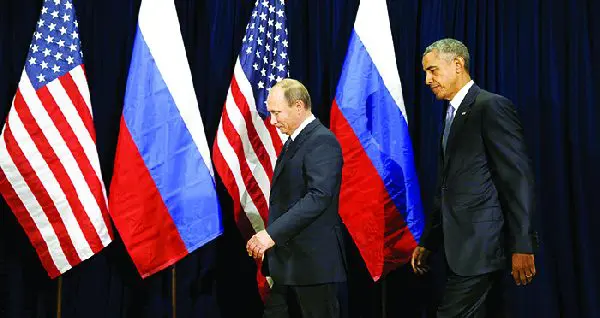
“Even Turkey, whose prime minister once compared Assad to Hitler, is backtracking its position on the Syrian president.”
The direct Russian intervention in Syria is the peak of an increasingly aggressive foreign policy in the Middle East that the Kremlin has been undertaking since Vladimir Putin’s rise to power 15 years ago.
Russia’s bombing campaign against Syrian rebels is a turning point in international relations and the balance of power in the Middle East. The Russian intervention comes after the shortcomings of the U.S.-led bombing campaign against ISIS, which has largely failed to achieve its stated goal to “degrade and eventually destroy” the terrorist group.
On the ground, Russia made it clear that its war is against all fundamentalist extremist armed groups in Syria, not only ISIS.
The Russian military campaign comes within the context of Moscow’s proposed political solution for Syria. The Kremlin is advocating for a national unity government that would share powers with President Bashar Assad for two years, until an internationally monitored election is held, in which Assad can be a candidate.
Russia wants its ally Assad to be a part of Syria’s transition. And after the rise of extremism, Assad’s foes who have called on him to step down are now changing their stands.
Europe is feeling the heat of war with thousands of refugees trying to reach its shores.
German Chancellor Angela Merkel said last week that Assad should be part of negotiations with the West.
“We have to speak with many actors,” Merkel was quoted as saying at a news conference following an E.U. summit in Brussels. “This includes Assad, but others as well.”
Even Turkey, whose prime minister once compared Assad to Hitler, is backtracking its position on the Syrian president.
Turkey was among the first to facilitate arming rebels and call for regime change in Syria, but the Russian military presence is changing the equation.
Turkish President Recep Tayyip Erdogan suggested for the first time last week that the Syrian president could have a role to play in a future political transition.
“The process could possibly be without Assad or the transitional process could be with him,” Erdogan said.
It seems that the Russians have succeeded in convincing President Obama that Assad is a necessity to fighting terrorism at this point, despite American officials’ public insistence that the Syrian president must leave.
The Russian move puts Obama in an uncomfortable position, where he is forced to accept the imposed Russian solution to avoid unnecessary confrontation that would undermine the war efforts against terrorism.
During the U.S.-led intervention in Libya against Moammar Gaddafi’s forces in 2011, the West moved swiftly to impose a new status quo that Russia had to accept, despite its objections. “Syria is not Libya,” Putin is telling Obama as he turns the tables.
-Nabil Haissam is The Arab American News correspondent in Beirut






Leave a Reply